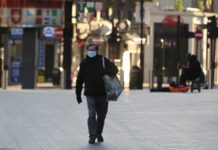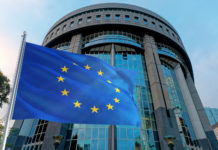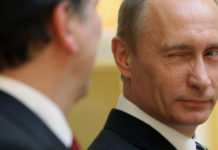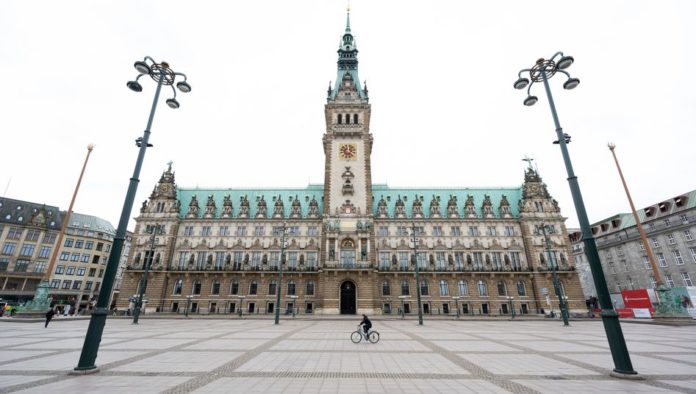Angela Merkel and the prime ministers are discussing how to proceed after April 19 – next Sunday
On this Wednesday Merkel is meeting with the heads of state governments. They must find a balance between the desire for normality and the protection of health.
Berlin (dpa) – In the Corona crisis, the first decisions on relaxing the strict rules are due this week. On Wednesday Chancellor Angela Merkel will discuss the matter with the state premiers.
On Monday the National Academy of Science Leopoldina pleaded for a “realistic” timetable back to normality. The influential scientists recommended that schools be reopened “as soon as possible” – starting with primary, lower and middle schools. There was praise for this.
However, the Leopoldina also named numerous prerequisites for public life to return to normal: The number of new infections must stabilise at a low level. Clinics would need sufficient reserves. Protective measures such as hygiene, distance rules and the wearing of protective masks must be observed. Then retail and hospitality could reopen, people could travel again. For public transport, the scientists recommend compulsory mouth protection.
Merkel and the prime ministers are discussing how to proceed after April 19 – next Sunday. On 22 March, the round had decided on comprehensive restrictions, initially for two weeks. These were then extended until the week after Easter. Sports and cultural events with spectators had already been banned before. Most shops – with the exception, for example, of grocery stores – have been closed since then.
Research Minister Anja Karliczek (CDU) called the Leopoldina recommendations an “excellent basis for consultation”. The top priority remains to reduce the risk of infection and protect risk groups. Saxony-Anhalt’s Prime Minister Reiner Haseloff (CDU) spoke of the “most well-founded and plausible scientific recommendation for action on the corona crisis to date”.
Over Easter the call for a gradual relaxation of the rules became louder. FDP leader Christian Lindner called for a corresponding plan from North Rhine-Westphalia to become a “blueprint for all of Germany”. Former Union faction leader Friedrich Merz told the dpa that it was “important to get back to normal work in companies as soon as possible”.
Minister of Defense Annegret Kramp-Karrenbauer (CDU) offered help from the Bundeswehr, for example, in tracing chains of infection. Federal President Frank-Walter Steinmeier, however, called for patience, discipline and solidarity. The television address was the first time that a German head of state addressed a current event in this form.
In the newspapers of the Funke Media Group, Saarland Premier Tobias Hans called for a “master plan” for dealing with the virus. “It is not about a return to normality, but what a new normality will look like,” said the CDU politician. North Rhine-Westphalia’s Premier Armin Laschet (CDU) prepared citizens for “many small, cautious steps”. “The willingness to renounce also needs a prospect of normalization. We need a roadmap that shows us the way to responsible normality.”
According to a survey, among the population the fear of the virus still outweighs the longing for normality. The majority of Germans are against a relaxation of the ban on contact. In a survey by the polling institute YouGov on behalf of the German Press Agency, 44 percent pleaded for an extension of the measures beyond April 19. 12 percent are even in favour of a tightening. Only 32 percent are in favour of a relaxation, and 8 percent for an abolition of the restrictions.
This is in line with the fact that, according to the state authorities, people largely followed the rules on Easter. Only occasionally there were parties or meetings of larger groups. In Brandenburg, police had to chase excursionists from a lake because they were too close together in the sun. Health Minister Jens Spahn (CDU) had said that the behaviour over the East was decisive for whether a relaxation of the rules was possible.
The protective mask recommendation of the Leopoldina is likely to trigger mixed feelings among citizens. According to the YouGov survey, 33 percent want to limit such an obligation to supermarkets as in Austria. Another 21 percent think that protective masks should be worn everywhere in public. 37 percent are against the obligation to wear protective masks.
According to another survey, the Union continues to increase its popularity with voters. In the “Sonntagstrend” of the “Bild am Sonntag”, CDU and CSU together now reach 37 percent – an increase of 4 percentage points compared to the previous week. This puts the Union in the best position it has been in since September 2017. Coalition partner SPD, on the other hand, only achieved 17 percent (-1). This means second place, because the Greens lost two points and ended up at 16 percent. The AfD is ten, the Left Party nine and the FDP six percent.






























